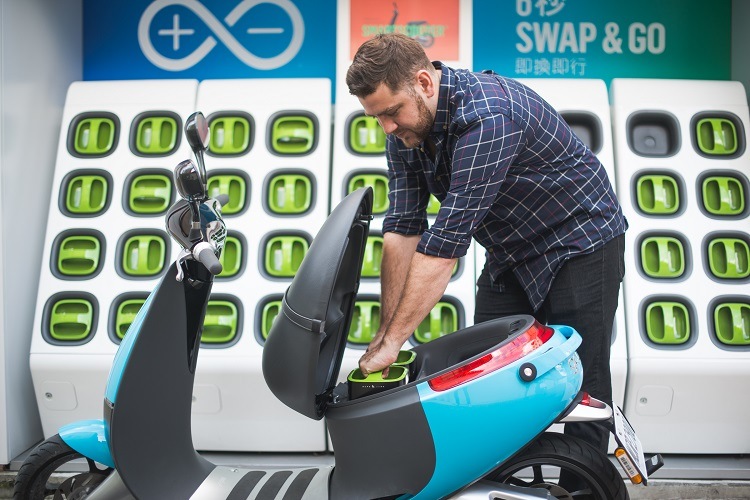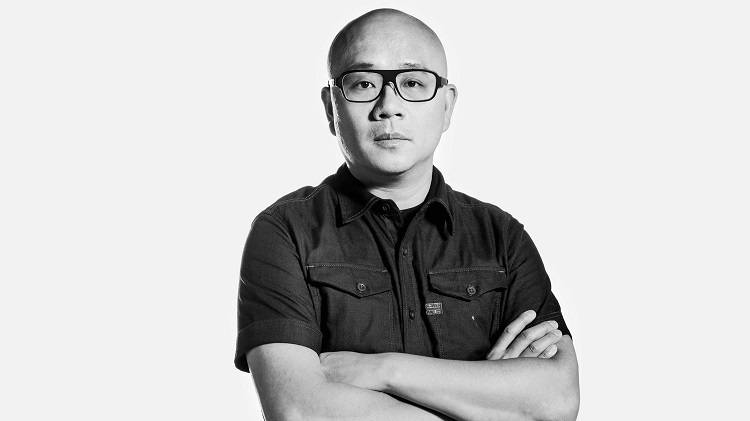
Battery swapping at a Gogoro GoStation. Photo credit: Gogoro.
Taiwanese company Gogoro is known for its “smart scooter,” an electric bike that stands out from the competition with its stylish look and geeky heart.
But the firm, founded in 2011 by HTC veterans Horace Luke and Matt Taylor, is thinking bigger than that. The team’s vision involves energy solutions that could end up powering a lot more than just their scooter. It hinted at this from the start: When the company launched, its product was only described as “a device around energy management.”
Gogoro created a network of charging stations called GoStations to support the bike’s energy needs. There, you can swap your vehicle’s spent batteries with fresh ones. The accompanying app shows you the closest battery station and allows you to book fresh batteries in advance. The service, which includes support and road assistance, is offered through a subscription fee.
At the moment, it has over 400 such stations in Taiwan, with more than 34,000 vehicles sold in the country. But in the future, the charging station model could be used to power other types of vehicles and even serve other energy-related purposes.
“Vehicle makers see how many stations we have and how we can swap batteries anywhere,” Luke, Gogoro’s CEO, tells Tech in Asia. “Other potential industries include logistics and warehousing, or industrial applications.”
Fully charged
Gogoro announced today it’s raised US$300 million for its series C round. Investors include London-headquartered Generation Investment Management, which is chaired by former US vice president Al Gore and invests long-term in sustainability, clean energy, and mobility projects.
Gogoro wants to boost its station network so it can better predict demand spikes.
Also joining in are Singaporean state fund Temasek, Japan’s Sumitomo Corporation, and French electric utility company Engie. Existing investors also participated, including founding investor Dr. Samuel Yin, Panasonic, and more.
Gogoro gains from its new investors’ local and regional connections which include strategic benefits for expansion. While it’s not making any announcements in terms of new markets, it’s definitely looking at several regions with interest, including scooter-happy Southeast Asia.
The funding will also go into technology development and hiring. Gogoro wants to boost its station network so it can better predict demand spikes and know when it needs to get more batteries charged. This way, it doesn’t waste energy charging batteries that aren’t going to be used.
“It’s not as simple as putting a battery [in the station] and charging it,” Luke says. The company plans to work on machine learning and big data applications to let the network make such decisions on its own.

Gogoro co-founder and CEO, Horace Luke. Photo credit: Gogoro.
Betting on electricity
Trying to expand in more markets, Gogoro has remained flexible. While it’s managed to get good traction and coverage with its GoStations in Taiwan, it’s not easy to replicate that model elsewhere.
A partnership with Bosch that kicked off last year allowed it to bring its scooters to Berlin and, more recently, to Paris, but based on a bike-sharing model. Using an app called Coup, people can pick up the scooter closest to them and ride it to their destination.
In the future, Gogoro’s charging station model could serve other energy-related purposes.
The company doesn’t use docking or charging stations in this scenario. Instead, it sends its team out to change the batteries of scooters that are running low, while at the same time hiding those scooters from the app.
In late 2015, Gogoro decided to bring its scooters and network of charging stations to Amsterdam. Immediately after the announcement, however, it was approached by Bosch with the bike-sharing proposal, so the Amsterdam plans were delayed.
Gogoro has 1,600 bikes in Berlin and Paris at the moment. Luke says the sharing model could be the way into other territories like Southeast Asia, but the company is still exploring options.
Coming from HTC, where he served as chief innovation officer, Luke saw first-hand one of the challenges of building hardware products – customer stickiness. Once someone buys your phone, for example, that’s it from that customer for maybe a couple of years or more.
See: Gogoro is a geeky electric scooter with the soul of a motorbike
The way Gogoro works in Taiwan – selling the bike with a subscription for the batteries on top – ensures an ecosystem of customers who come back again and again. With a scooter’s average age in the seven-to-10-year range, the subscription revenue gives the company a lot of room for growth and evolution. Luke declines to talk about Gogoro’s revenue in more detail.
He also believes the timing is right, with several countries including India and China pledging to reduce fossil-based fuel consumption. The opportunity is not lost on competitors either, with manufacturers like BMW and Vespa building their own electric bikes – although without getting into swappable battery tech like Gogoro.
Other companies working on batteries for vehicles, except Tesla of course, include Austrian startup Kreisel Electric.
The new investment brings Gogoro’s total funding to over US$480 million. The company had previously raised US$130 million from investors including Panasonic, which works with Gogoro on the scooter’s batteries, and the National Development Fund of Taiwan.
This post E-bike startup Gogoro raises $300m to expand its smart energy network appeared first on Tech in Asia.
from Tech in Asia https://www.techinasia.com/gogoro-series-c-funding-smart-scooter
via IFTTT
No comments:
Post a Comment